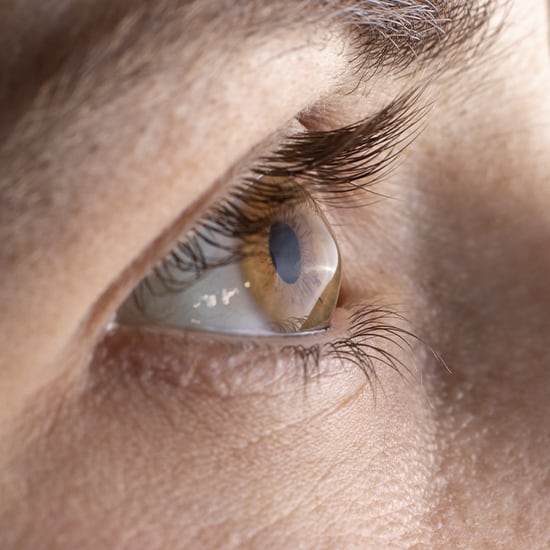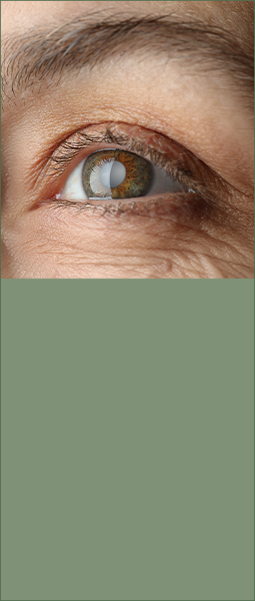Comprehensive Keratoconus Management
Keratoconus is a corneal dystrophy that causes a progressive thinning of the cornea leading it to bulge outward and take on a cone like shape. This change in shape causes increasing amounts of astigmatism that often don’t correct well with traditional glasses and soft contact lenses.
Keratoconus changes how the light focuses in the back of your eye which can cause vision distortion. We aim to correct the vision of our patients with keratoconus by providing thorough, comprehensive eye exams and discussing different options for seeing clearly.
Cherry Creek Eye offers treatment options like Synergeyes hybrid lenses, scleral contact lenses, corneal cross-linking and Intacs, which can help provide clear vision and an improved quality of life for people with keratoconus.
Book an appointment today to discuss your options for managing keratoconus.
Book Appointment

Symptoms of Keratoconus
You may have keratoconus if you are experiencing vision problems, having trouble finding the right prescriptions, or have any of the following symptoms:
- Distorted vision
- Double vision
- Seeing halos around light
- Sensitivity to light
When you visit our team, we can help you find the right solution for managing keratoconus and seeing clearly.
Keratoconus Management & Surgical Options
If you are experiencing vision problems and traditional corrective treatments aren’t solving them, you may have keratoconus. Keratoconus requires correction based on the irregular shape of the cornea.
In most cases, specialty contact lenses can improve the vision for those with keratoconus, while in other cases, surgical procedures may be needed to optimize the vision. Our keratoconus treatment and management solutions include specialty soft lenses, Synergeyes hybrid lenses, corneal rigid gas permeable lenses, scleral contact lenses, corneal cross-linking, and Intacs.
SynergEyes
SynergEyes is a hybrid contact lens with 2 different materials in its structure. The middle has a more rigid material, and the outer ring is made of a softer material. The rigid part of the lens helps to correct the vision on the central cornea, and the soft outer ring helps improve centration and comfort.
Scleral Lenses
Scleral contact lenses are rigid gas-permeable (RGP) lenses that are wide enough to rest on the sclera of the eye, the outer white part. This can allow for a better comfort and improved vision clarity for people with conditions such as keratoconus and dry eyes.
Corneal Cross-Linking (CXL)
Corneal cross-linking (CXL) is a surgical procedure that involves linking collagen fibers together to strengthen the cornea and slow the progression of the disease. While cross linking can cause some mild flattening of the cornea which in some patients can cause a mild improvement of vision, this is not guaranteed and can take up to a year after the procedure to occur.
Intacs
Intacs are designed to correct the effects of keratoconus with a flat device inserted deep within the cornea to flatten the central cornea. They are designed to reshape the cornea into a more natural, round shape to help improve vision without resorting to more complicated procedures, such as a corneal transplant.
Facts About Keratoconus
If you’d like to learn a little more about keratoconus, take a look at some facts about this condition:
- Keratoconus is a disease of the cornea that affects 1 in 500 to 1 in 2,000 people in the general population.
- Its cause is unknown.
- With keratoconus, there is a breakdown of the inner tissue or layers of the cornea, which weakens the corneal structure. Due to normal eye pressure affecting a thin cornea, the cornea can begin to push outward, taking on a conical shape.
- With keratoconus, the cone or bulge causes light entering the eye to become scattered, distorting the way you see images. In advanced stages, seeing can become extremely difficult.
- Keratoconus often starts during a person’s teenage years. Biological changes such as puberty or pregnancy can trigger the disease.
- It is often a bilateral disease, meaning it affects both eyes, and there can be a delay of up to 5 years before the second eye begins to show symptoms.
- The most common symptom of keratoconus is fluctuating vision. A new set of contact lenses or glasses may provide crisp, clear vision, but only for a short period of time. Within 3 months to 1 year, your vision may have decreased again, and a visit to the eye doctor may be required.
Review Your Options for Keratoconus Management
Keratoconus can be a mysterious eye condition for those who have it—you may think you just need a new prescription, and then your vision changes again. We want to answer all your questions and help you see clearly.
Keratoconus can require continuous monitoring—and sometimes surgical care—in order to be properly treated. We want to help you find the right option for your unique eyes.
Visit us to discuss keratoconus, and let’s review your options for seeing clearly.
Book AppointmentOur Location

Our Address
- 4999 E. Kentucky Ave., Suite 202
- Denver, CO 80246
Contact Information
- Phone: 303-691-2228
- Fax: 303-759-9052
- Email: info@cherrycreekeye.com
Our Hours
Hours
- Monday: 8:30 AM – 5:00 PM
- Tuesday: 7:30 AM – 4:00 PM
- Wednesday: 8:30 AM – 5:00 PM
- Thursday: 8:30 AM – 5:00 PM
- Friday: 8:30 AM – 4:00 PM
- Saturday: Closed
- Sunday: Closed
Our Services
Why Choose Cherry Creek Eye?

Cataract Surgery Experience
Regain clarity and vibrancy in your vision with our comprehensive cataract surgery services. We use technology and personalized care to help guide you through the cataract surgery process.
Cataract Surgery Experience

Regain clarity and vibrancy in your vision with our comprehensive cataract surgery services. We use technology and personalized care to help guide you through the cataract surgery process.
Cataract SurgeryDedicated Keratoconus Treatment

If you’ve been diagnosed with keratoconus, a condition that affects the shape of your cornea, we offer management options like scleral lenses to improve your vision and manage the progression.
KeratoconusSpecialty Contact Lenses

Not all eyes are created equal. We specialize in fitting a wide variety of specialty contact lenses for complex vision needs, including keratoconus, astigmatism, and presbyopia.
Contact Lens Exams, Fittings, & Brands








